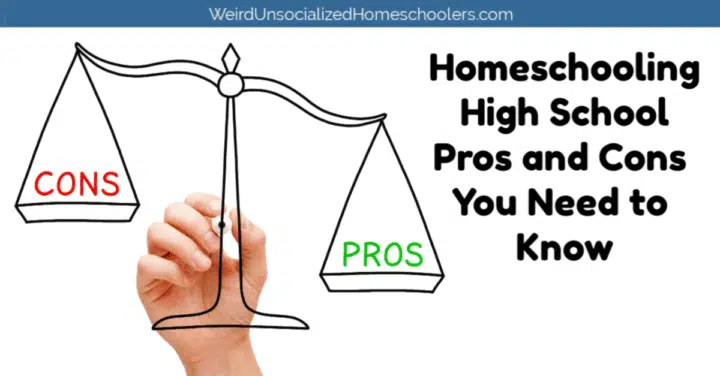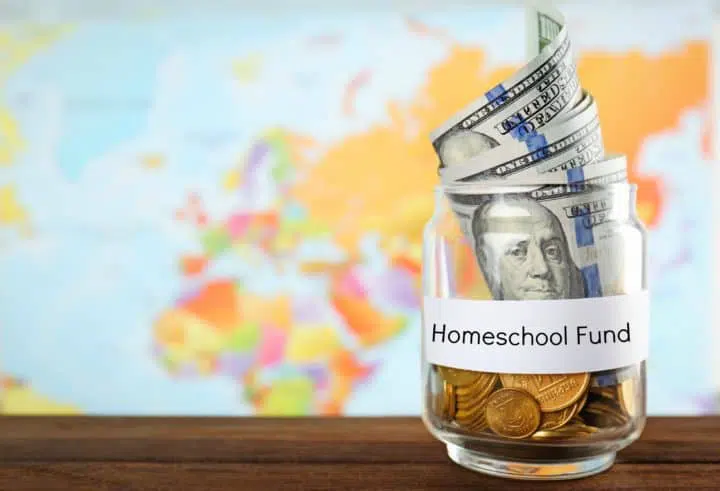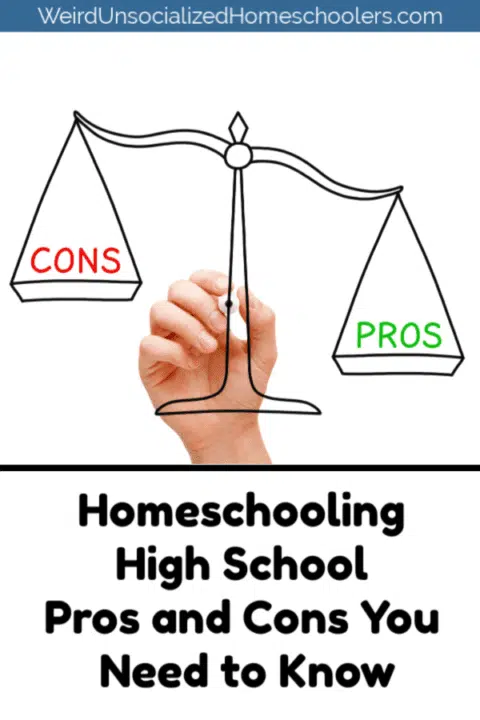Homeschooling High School Pros and Cons You Need to Know
There are advantages and disadvantages to homeschooling high school. Learn the homeschooling high school pros and cons you need to know.
As my friend and I walked the track that spring day, I made a quiet, shameful confession. “Sometimes I wish I’d sent my kids to public school just so all this, good or bad, would be the school’s responsibility.”
Surprisingly, not only was my friend not shocked and appalled, she understood. This homeschooling gig can be hard, y’all. Especially when you get to high school and start thinking of all the things your teens may someday blame you for – regardless of whether any of it is actually your fault.
Sometimes you don’t even have to wait until someday to get the blame. We all need a scapegoat.

I’ve shared some thoughts about the plusses and minuses of homeschooling high school before. However, those thoughts were more my perspective as the mom, watching my babies grow up.
Now, I want to offer the nitty-gritty pros and cons of homeschooling high school as they relate to a teen’s academic and social experience.
Pros of Homeschooling High School
Interest-led Is Okay
When you homeschool high school, you can let your student’s interests drive your course planning. I wish I had understood this better with my oldest. You don’t have to be a full-fledged unschooler to take advantage of interest-led learning all the way through high school. (Though it’s important to note that an impressive unschooling transcript is entirely doable.)
For most of us, there are some non-negotiable classes that our teens need to take, such as algebra or geometry. However, in other areas, there is a lot of room for following your teen’s interest. Lab sciences don’t mean only biology and chemistry. History encompasses much much than just U.S. and generic world history classes.
Optimal Use of Time
I’m not going to pretend that no time-wasting happens at my house. The phone rings. One of the many pets needs attention. The Facebook Sirens call. However, because activities such as roll calls and class changes are unnecessary, we’re able to get about the business of schooling with less wasted time.
My teen may school at odd times, but once she’s in school mode, she can work quickly and efficiently with fewer interruptions.
Freedom and Flexibility
I was a high-average student in school with good attendance. I enjoyed learning. The only time I ever skipped school was senior skip day, and I cleared it with my mom first.
Even so, by about the middle of my senior year, I was over school. So many of the classes I was taking were only time-fillers. (And, then there was the history class where all we ever did was work crossword puzzles and watch Baja races. Seriously.)
I was ready to be done. I wish I had gone the vocational route that my best friend took that allowed her to leave school around noon each day to go to work.
Homeschooling provides the freedom and flexibility that I craved as a teen. We can adjust our students’ schedules so that they can work, volunteer, apprentice, pursue hobbies, or take community classes at times most traditionally-schooled students can’t.
Sleep
Studies have proven that teens need 8 to 10 hours of sleep each night and that their circadian rhythms differ from that of children and adults. Teens are wired to stay up later at night and sleep later during the day.
Homeschooling allows teens to tackle schoolwork during their most alert, productive hours instead of forcing them to work against their bodies’ natural rhythms.
Abundant Resources
With the internet and the prevalence of homeschooling today, homeschooled teens have a wealth of information available to them. Limited income doesn’t have to limit resources thanks to the many fantastic free and frugal options for homeschooling high school.
And, if you do have the resources, there are a wide assortment of online and community classes, dual enrollment options, and private lessons for homeschooled teens.
Opportunities for Real-world Application
Because of their flexible schedules and the ability to customize a homeschooled teen’s education, they often have more opportunities for real-world application of the things they’re learning than their traditionally-school peers.
Cons of Homeschooling High School
Expense
While frugal alternatives are available, homeschooling high school can be expensive. My teenager recently saw how much one of her courses cost and said, “Good grief! No wonder you want me to finish this.”
No kidding, kid.

In addition to the cost of textbooks, there are supply costs such as microscopes and other lab equipment, computers, tablets, and elective courses. Some of these things you’d likely purchase even if your teen attended public school, and there are ways to save money on supplies. But when you homeschool, parents foot the bill for a lot of the resources students might have free access to in a traditional school.
No Built-in Structure
Traditionally-schooled kids are in their brick-and-mortar buildings during school hours every day (more or less) of the school year. Parents may have to nag them to complete their homework, but classes, labs, lectures, and tests happen during school hours. Most high school students do what’s expected of them while they’re at school because they might as well. They’re going to be there regardless.
That built-in structure is lacking in homeschools, and the blessing of flexibility can sometimes be a curse.
When teens are in public or private school, they usually have the option of carrying on with classes no matter what interruptions life throws in their family’s way.
Missed Opportunities
I like the phrase opportunity cost. It basically means that saying yes to one thing means saying no to another. That’s true in every facet of life.
Regardless of how many opportunities modern homeschooling offers, there are always going to be fun, useful parts of school that we can’t replicate. Even the negative experiences that come with a traditional school setting can provide valuable life lessons.
Homeschooled students are likely to miss out things like pep rallies, football games against the school’s arch rival, homecoming, and complaining about cafeteria food. Graduation may be a much smaller, less elaborate affair.
Unless your teen attends co-op, he may not experience collaborative projects or have lab partners.
Of course, there are unique homeschooling experiences that public schooled teens miss. Each family must weigh the opportunity cost of their choices.

Less Social Interaction
Although homeschooled kids aren’t locked in their basements as stereotypes suggest, their social circles are more limited, providing fewer social interactions than a traditional school setting.
That means a smaller pool of similar-aged peers for forging friendships and dating. While a smaller social group typically also limits negative experiences, such as bullying, it may leave homeschooled kids a bit inexperienced dealing with conflict or peer pressure.
Homeschooled kids tend to maintain a childlike innocence longer than their public schooled peers (which isn’t necessarily a bad thing). They may seem a bit more naïve or less “street-smart” than traditionally-schooled teens.
More Work and Pressure for Parents
Homeschooling high school means that a teen’s education rests solely on the shoulders of their parents. That knowledge can create a tremendous sense of pressure.
Although we transition from teacher to facilitator in the high school years, homeschooling still means a lot of work for parents. We have to pull together resources for our kids, help them seek and capitalize on opportunities, and make sure we’re preparing them for life after high school.
Parents must be willing to shoulder the added work and responsibility or risk placing their homeschooled teen at a disadvantage with regards to their future educational and career options.
Before you transition from teacher to facilitator to scapegoat, weigh the pros and cons of homeschooling high school. Talk to your teen and your spouse. For us, the benefits outweighed the disadvantages, but I wish I could have gone into the high school years with a clearer picture of both.
If you’ve homeschooled high school, what pros and cons would you add?
You Might Also Like
Kris Bales is a newly-retired homeschool mom and the quirky, Christ-following, painfully honest founder (and former owner) of Weird, Unsocialized Homeschoolers. She has a pretty serious addiction to sweet tea and Words with Friends. Kris and her husband of over 30 years are parents to three amazing homeschool grads. They share their home with three dogs, two cats, a ball python, a bearded dragon, and seven birds.







My son just started high school this year and I love that we can continue to work at a speed and skill that works best for him. He also takes time to work usually at least once a week and we can schedule his class times around that. However, we only know of 2 other high school students that are being homeschooled so yeah… socialization can be lacking at times. Luckily he’s still friends with public school kids and our schedule can easily accommodate friends at just about any time that works for them.
I find that the biggest con to homeschooling high school for me is that I’ve put off starting the high school transcripts for my son. He’s in 11th grade now, and I have some catching up to do. We’ve been swinging between relaxed homeschooling and structured.. so I’m now having to figure out how to count credits for things that he has learned. I also have a 9th grader, 6th grader and a 4th grader coming up after my oldest.. 😀 Ugh!
I’m in Manitoba Canada…. so the laws only require minimal reporting and record keeping. I found it much easier in a way.. when I lived in Pennsylvania.. where extensive records were required, keeping me more accountable..
This is where we are. One starting high school. Fun, energetic, bright… but no local social group….
Looking at sports and classes with local high school… but it is not a very good option.
Praying for answers,
Janet
Thanks for being honest. My oldest is in Grade 11 and said he regrets choosing to homeschool high school. It’s not because it hasn’t been enjoyable.
He felt that homeschooling hasn’t given him the structure he has needed to accomplish goals he had for himself. High school is tough when you are the kind of kid who learns best in a class with a teacher. We don’t have money for the online classes and our area doesn’t have a co-op for high schoolers.
I have felt out of my element as well. I didn’t really enjoy high school science and so that has been an area we have really suffered in.
I’m not worried for my son’s furure. He is a smart kid and has the character qualities to do well in life, but it has given me a lot to think about when deciding what’s best for my next 3 kiddos.